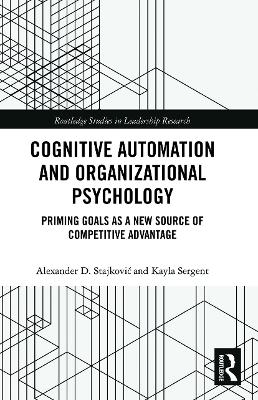
Cognitive Automation and Organizational Psychology
Routledge (Verlag)
978-0-367-78599-4 (ISBN)
Building on research in social psychology and organizational behavior, Stajković and Sergent introduce four models to explain how subconscious goals are primed in organizations:
•Auto-motive model: Repeated practice with a goal makes cognitive automation possible.
•Goal contagion: Observing and inferring goals of others creates cognitive automation.
•Means-goal priming: Confidence in your goal pursuit enhances cognitive automation.
•A history of reinforcement: Money, feedback, and social recognition used to reinforce goal achievement become associated with the goal, resulting in cognitive automation.
The authors canvas a broad range of knowledge concerning the problem of employee cognitive overload in contemporary organizations and rely on multidisciplinary research to propose cognitive automation as a solution that can address it directly. This book is a deep well of valuable information for those interested in solving real work problems with application of science of organizational behavior (SOB).
Alex Stajković is the M. Keith Weikel Distinguished Chair in Leadership and Professor of Organizational Behavior at the University of Wisconsin-Madison. Alex earned both his Masters and Ph.D. in Organizational Behavior from the University of Nebraska-Lincoln. Alex’s research has been featured in the New York Times, Elle Magazine, and BizEd, as well as premier journals in Organizational Behavior and Psychology, such as Academy of Management Journal, Journal of Applied Psychology, Organizational Behavior and Human Decision Processes, Personnel Psychology, and Psychological Bulletin. He has taught Organizational Behavior in the Executive and Evening MBA programs, as well as in the doctoral program, at the Wisconsin School of Business for 20 years. Alex has given over 100 presentations, invited talks, and has consulted globally. For more information see his website: www.stajkovic.biz Kayla Sergent is Assistant Professor of Management at Edgewood College. Kayla earned her Ph.D. in Organizational Behavior from the University of Wisconsin-Madison. Kayla’s research has been published in Journal of Business and Psychology, Applied Psychology: An International Review, Personality and Individual Differences, and Journal of Occupational and Organizational Psychology. She teaches Organizational Behavior in the Evening MBA and undergraduate programs at Edgewood College. Kayla has consulted on transformational leadership, creativity, and organizational culture. For more information see her website: www.sergent.biz
Introduction
Part I: The Problem and Proposed Solution
Chapter 1: Skyrocketing Cognitive Load Versus the Snail’s Pace of Attentional Adaptation
Part II: Theory Foundations
Chapter 2: Self-Regulation Guided by Conscious Goals
Chapter 3: Subconscious Processing and Cognitive Automation
Chapter 4: Four Conceptual Models of Goal Priming
Part III: The Latest Empirical Research
Chapter 5: Organizational Behavior Research on Priming Goals Guided by the Auto-Motive Model: Evidence from 15 Studies
Chapter 6: Organizational Behavior Research on Priming Goals Guided by the Goal Contagion Model
Chapter 7: Organizational Behavior Research on Priming Self-Efficacy as a Means-to-a-Goal
Chapter 8: Organizational Behavior Research on Priming Goals by History of Reinforcement
Chapter 9: Limitations, Methods, and Future Research
Chapter 10: Application: Is Priming Ready for Prime Time
The Past is Prologue
Author Biographies
Index
| Erscheinungsdatum | 06.04.2021 |
|---|---|
| Reihe/Serie | Routledge Studies in Leadership Research |
| Verlagsort | London |
| Sprache | englisch |
| Maße | 152 x 229 mm |
| Gewicht | 453 g |
| Themenwelt | Wirtschaft ► Betriebswirtschaft / Management ► Planung / Organisation |
| Wirtschaft ► Betriebswirtschaft / Management ► Unternehmensführung / Management | |
| Wirtschaft ► Volkswirtschaftslehre | |
| ISBN-10 | 0-367-78599-4 / 0367785994 |
| ISBN-13 | 978-0-367-78599-4 / 9780367785994 |
| Zustand | Neuware |
| Informationen gemäß Produktsicherheitsverordnung (GPSR) | |
| Haben Sie eine Frage zum Produkt? |
aus dem Bereich


